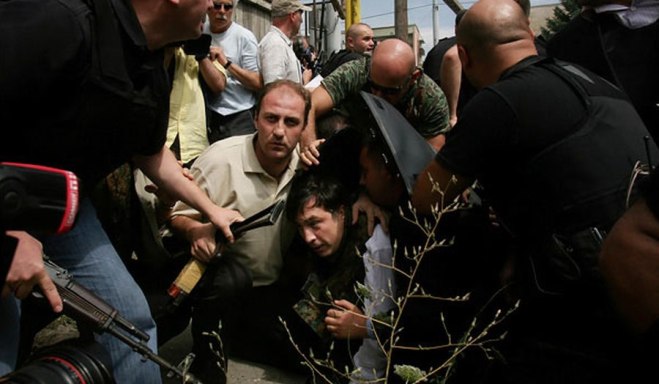Hummers for Peace?, by Peter Lavelle

Saakashvili in Gori
Well it happened and there is no turning back – Russia has recognised the independence and sovereignty of South Ossetia and Abkhazia. For the people of both, the human rights tragedy they have long experienced is coming to an end. The international community needs to understand their plight and update international law to protect us all.
Moments after Russian President Dmitry Medvedev signed the degrees recognising the sovereignty of South Ossetia and Abkhazia, I found myself sitting in RT’s news studio. I would sit there for the next six hours non-stop. During that time I read out every condemnation of Russia’s decision reported by the wire services. Of course these condemnations came from the usual suspects. The US State Department, NATO, the EU, Council of Europe, pesky eastern European governments, and others of the same stripe singing the same tune. And it was expected: “Russia’s decision was not in line with international norms and law.”
In a strictly and outdated way they may be right, but for the wrong reasons. Russia’s decision to move forward with recognising the sovereignty of South Ossetia and Abkhazia signals what is wrong with the international system that has spent itself and how that same system needs to be righted in the present when looking to the future.
Why did Russia recognise the independence of South Ossetia and Abkhazia so quickly? Wasn’t such recognition a valuable bargaining chip to be kept up Russia’s sleeve to thwart off intended NATO expansion into the South Caucuses? To be honest, that was my initial take on the situation after Tbilisi de facto admitted defeat in the wake of its aggressive war against South Ossetia. My mistake had everything to do with not understanding how Russia is disappointed with and is no longer willing to abide by the current dysfunctional international order.
Russia has signaled that the post-Cold War period is over – all former bets are off. And that its former weakness in light of the West’s presumed strategic and moral hegemony since the end of the Cold War no longer applies. I agree with this, but not for the reasons the commentariat claim.
I refuse to accept the following explanation for all of this: if Washington and its coalition of the willing can put aside international law to recognise Kosovo, why can’t Russia do the same to recognise South Ossetia and Abkhazia?
I wish all of this was so simple. The above explanation is really nothing more that “tit-for-tat” (with a bit of revenge added). There is much more than this in play. The ideas that we take for granted today about a state’s sovereignty, territorial integrity, and universal human rights come from a time that long ended. That time, the Cold War, can no longer be our guide. All these ideas need to be re-examined. The lesson of Saakashvili’s Georgia is a case in point.
Saakashvili counted on the West’s support of his country “sovereignty” and “territorial integrity” when he attacked South Ossetia and Russian peacekeepers. He felt he was on solid ground irrespective of the outcome – victory or defeat. But he miscalculated. There is another important variable that he forgot or hoped the international community would overlook - the respect of human rights. Saakashvili refused to sign an agreement that denied him the right to use force against his own people. This was his biggest single mistake. This opened the door for Russia to do the right thing.
During the 1970s, the West hoped to counter the Soviet Union’s appalling human rights record to challenge and defeat it in the Cold War. This strategy culminated in the Helsinki Accords (“basket number 3” to be exact). This was a wise decision. The Soviet Union could never win the Cold War based on its human rights record. The Soviet Union signed-up to the Helsinki accords, but could never live up to them. Saakashvili made the same mistake. He thought he could con the world with his fine Western-intended words. But his actions inform us of a completely different reality – no different from the Soviet Union tried to do.
Finally, this brings me to America’s lost or kept hostage Hummers in Georgia. This subject is pathetic. The Pentagon wants the return and immediate release of these classy vehicles. The Pentagon is in no position to say anything about their beloveds’ fate! They were transporting who and what kind of armaments!?
For me, America’s high priority concern puts everything into perspective.
Saakashvili’s Georgia is part of NATO’s “Partnership of Peace” program for only one reason – to finally become a member of NATO itself. This is all nice and fine. But I have to question this military alliance and Saakashvili’s Georgia: why do both focus international media attention on military vehicles over the plight of South Ossetians? Are vehicles more important than people?
My, how the world has changed! But not in the right way. American Hummers for Georgia were for one reason – war and aggression. Russia’s recognition of South Ossetia and Abkhazia is in the name of peace. Think about it - there is a big difference separating both approaches. Let’s put human rights back on the agenda. Russia’s recognition of South Ossetia and Abkhazia does this.